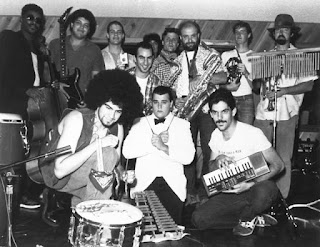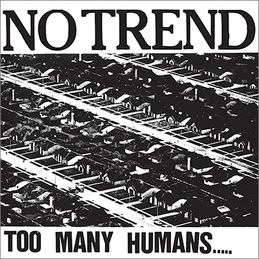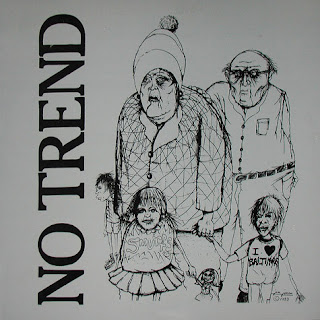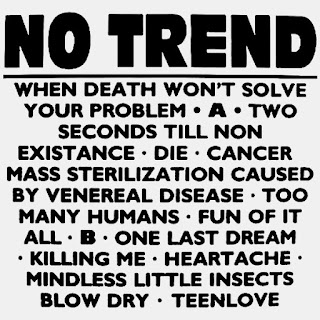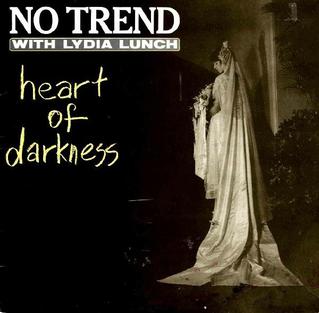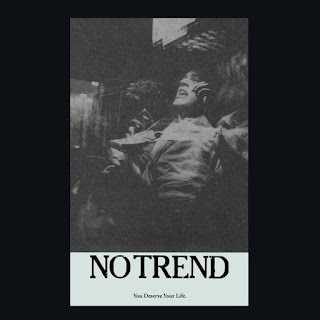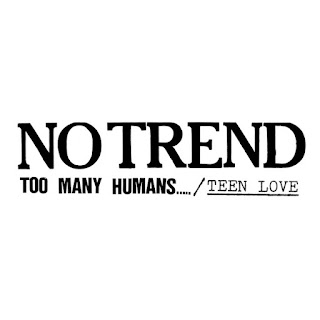
Saturday, 28 October 2023
Lync

Monday, 23 October 2023
Tears Of Joy
Thursday, 2 March 2023
The Fire Theft
Saturday, 4 February 2023
No Trend
No Trend were a noise rock/post-punk band from Ashton, Maryland that were around from 1982 to 1988. The first incarnation of the band was a four-piece, comprised of members who came into the band with a punk/hardcore background. Despite this, they were intentionally antagonistic towards the DC scene they existed in the periphery of, wanting to eschew the subculture that had grown out of it. They set out to make music that they wanted to make, with no creed or agenda, and it shows. For their early material, Flipper and Saccharine Trust are often cited as loose comparisons, though No Trend really did occupy a space of their own. Teen Love was their debut, a 7" they self-released (as they would for the majority of their material). This was followed up by a full-length, Too Many Humans. These are the best introductions to the band, as they immediately throw you into the misanthropic, nihilistic world they created. Through driving bass lines, pummelling drums, and trebly feedback-laden guitars, vocalist Jeff Mentges delivered shrieks, screams, and the occasional spoken word. It makes for an impactful listen, and highly recommended to anyone looking for raw, unbridled negativity.
Following these early years, the band experienced a line-up overhaul, with Mentges being the only original member left for by their second album. 1985's A Dozen Dead Roses was a major shift from the overt, noisy and hardcore-adjacent sound they were founded on. Though there are still flashes of that, they expanded their sonic palette to include elements of funk and jazz, while keeping the bass as the driving force behind these songs. Instrumentally, their palette is widened to include synths and saxophones, and the guitars are laden with chorus, taking on a more traditional lead role with a litany of classic rock-esque solos. A handful of tracks were also done as collabs with Lydia Lunch, which were also released on a separate EP. Overall, I absolutely love this album, as much as their early work, because it maintains that desperate, pessimistic aggression while exploring a new, genuinely unique avenue.
By 1986, the band had now rounded out as 12-piece to include strings, horns, and synths as mainstays of their sound. They continued on this wave of hybrid experimentation into their next full-length, with more layers of instrumentation and a cleaner sound. This record was put out by Touch And Go, their first to not be self-released. It was followed by another album slated to be released in 1989, but was shelved until 2001. More, as it became, completed their full heel-turn into deconstructionist jazz-funk, with their cleanest sound to date, but too Beefheartian avant-garde to ever come close to a traditional rock outfit.
No Trend were a one-of-a-kind band with an equally intriguing legacy. There's a few great articles that came out around the reissue of Too Many Humans / Teen Love, which I suggest checking from Bandcamp, The Washington Post and Tidal for more information. If you're new to this band, the aforementioned reissue is probably your best bet for a starting point. Enjoy.
Sunday, 11 December 2022
Jawbox
Jawbox are a four-piece post-hardcore band from Washington, DC that formed in 1989. The band was started by vocalist/guitarist J. Robbins, bassist Kim Coletta and drummer Adam Wade. Robbins previously played bass in DC hardcore band Government Issue during the final few years of their initial run. They put out their first EP in 1990 and followed it up with their debut full-length Grippe in 1991, both of which were released by Dischord Records. In their early years, the influence from the DC scene they emerged out of is most evident. In particular, the more melodic musings of Revolution Summer bands, alongside the throttling of Naked Raygun, the massive guitars and catchy hooks of Hüsker Dü, and the atmosphere of Joy Divison (who they cover on this album). It's a fantastic debut, and one that brought that stirrings of the punk underground into a more accessible, "alternative" styling. Shortly after it's release, guitarist/vocalist Bill Barbot jointed the band. They followed it up a year later with Novelty a year later, which saw the band experimenting with heavier, darker, and more discordant sounds, while they still keeping up the energy and melody of their debut. Drummer Adam Wade shortly after its release, and was replaced by Zach Barocas.
They were one of many indie bands that get swept up by major labels in the wake of Nevermind, with For Your Own Special Sweetheart being put in 1994 by Atlantic. It even spawned a (relatively) commercial single in "Savory". This album is a masterclass in post-hardcore, sitting on the precipice of dissonance and melody, being simultaneously heavy and catchy. It's a shuffle of muted strings, octave chords and arpeggios wrapped around a grooving bass line and frantic rhythms. If that sounds familiar, this band (along with others like Fugazi) is where it came from. They carried on this angular and off-kilter sound into their 1996 self-titled album, which ended up being their last as they parted ways in 1997. Members were involved in a number of projects thereafter, most notably Burning Airlines with Robbins and Barbot. Robbins has also worked as a producer with a ton of incredible bands, including Jawbreaker, Texas Is The Reason, The Promise Ring, Against! Me, Paint It Black, mewithoutYou, Coliseum, and a ton more.
They reunited in 2009 for a one-off show of "Savory" on Late Night With Jimmy Fallon, and 10 years later reunited full-time in 2019 to play shows again. In 2021, Bill Barbot left the band, with Brooks Harlan taking his place. This year marks their first new studio material in over two decades, with a re-recording of Grippe songs and a Wire cover. Without a doubt Jawbox are one of the greatest and most important (albeit underrated) post-hardcore bands, so if you are new to them I implore you to check them out. Enjoy.
Burning Airlines
Burning Airlines were a three-piece post-hardcore band from Washington, DC that formed in 1997 and broke up in 2002. Following the dissolution of Jawbox in 1997, vocalist/guitarist J. Robbins and guitarist Bill Barbot reconvened as Burning Airlines, with Barbot switching over to bass. They were joined by drummer Peter Moffet, Robbins' former bandmate in Government Issue. Barbot left the band in 1999 and was replaced by Mike Harbin (who had previously played in Admiral). Ben Pape joined them in 2000 as a second guitarist and keyboardist, rounding out their line-up as a four-piece.
Burning Airlines released two full-lengths, a 7", and two splits (both with incredible bands). Most of their material was released by DeSoto Records, a label run by Barbot and Kim Coletta. In many ways, this band was a continuation of Jawbox, with the duel-guitar mingling, off-kilter rhythms, and melodic vocals. I wouldn't say they sound exactly alike, more like a natural evolution had Jawbox continued. Which isn't surprising, considering it quite literally was the case for 2/3 of them. Having said that, I do want to underline that they do stand on their own They considered a name change near the end of their tenure (touring the US post-September 2001 with this name was... unfortunate), but decided against it. The band abruptly broke up the following year. Highly recommended stuff, enjoy.








